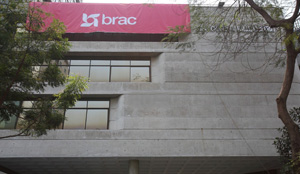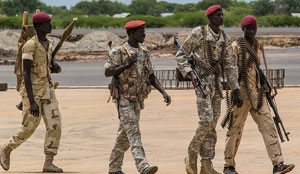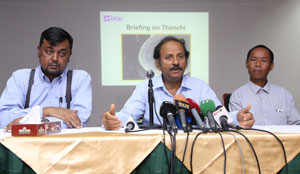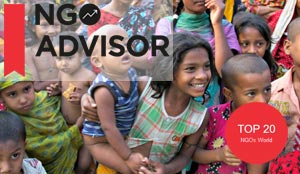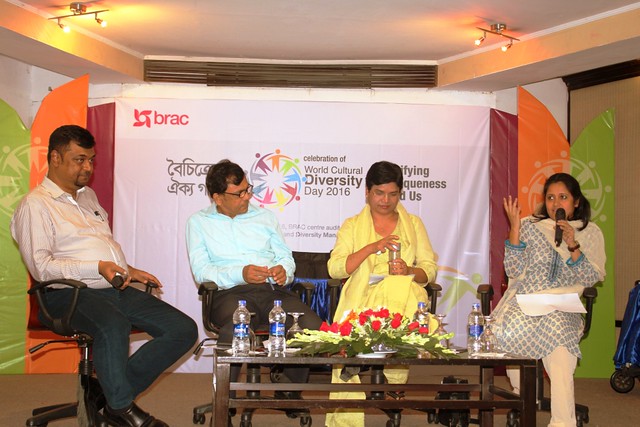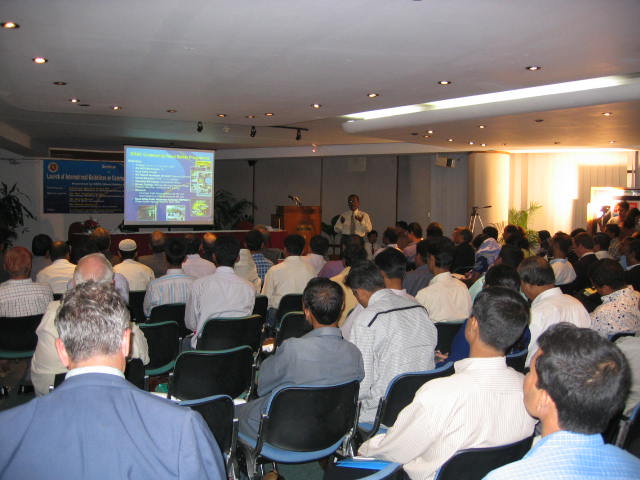
English (961)
Children categories
BRAC statement on Supreme Court ruling regarding income tax
The Supreme Court ruled in favour of the government today regarding BRAC’s taxable status. The income tax law changed over time and, as a result, the taxable amount applied to BRAC changed. BRAC contested that non-profit organisations should be exempt from income tax.
Today's ruling overturned the High Court verdict from 2014 that declared that the income from BRAC’s social enterprises would be exempt from income tax. BRAC is a non-profit organisation and the income generated by BRAC’s social enterprises supports BRAC’s social development programmes. In the 2014 financial year alone, BRAC paid more than 91 crore taka (11.61 million USD) in tax and other forms of revenue.
BRAC respects the latest ruling by the Supreme Court, the full text of which has not yet reached BRAC management. Once this verdict is received, we will take legal counsel and decide our next course of action.
Our social development programmes across the country and millions of people who benefit from them will not be adversely affected by the outcome of this ruling.
Vision centres for free eye care for the ultra poor
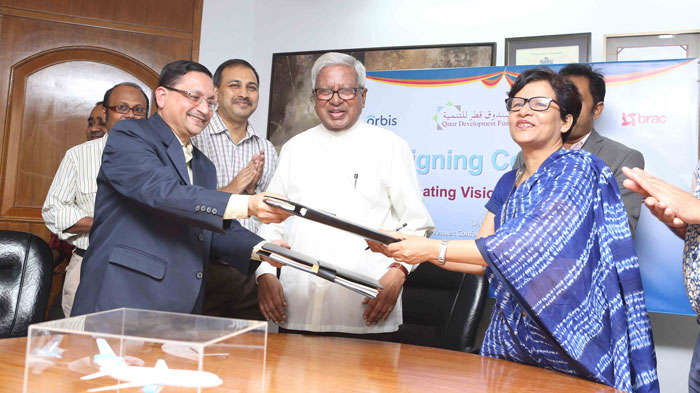
Dr Munir Ahmed (country director, Orbis International Bangladesh) and Dr Kaosar Afsana (director of HNPP, BRAC) exchange the MoU in presence of Sir Fazle Hasan Abed (founder and chairperson of BRAC).
BRAC and the US-based international organisation, Orbis International, with the support of Qatar Development Fund, has signed an agreement today for extending quality modern eye care treatment for the ultra poor. It aims to strengthen community eye health services across four districts, increasing access to eye care for children in Bangladesh. This activity forms part of a new initiative called Qatar Creating Vision (QCV).
The agreement was signed at BRAC Centre, in the presence of Sir Fazle Hasan Abed, chairperson of BRAC, Dr Kaosar Afsana, director of BRAC Health, Nutrition and Population Programme, and Orbis International Bangladesh's country director, Dr Munir Ahmed, and director of programmes, Md Alauddin.
At the occasion, Sir Fazle Hasan Abed said, “Many are suffering from vision problems, helping those unfortunates to see the world with primary care service is crucial. We must work collectively to ensure the primary eye care service for all.”
Country Director of Orbis International Bangladesh, Dr Munir Ahmed said, “We have committed to achieve the Vision 2020 goal, and without universal eye health coverage, this would be impossible.”
A spokesperson from Qatar Development Fund said, “Half of childhood vision loss can be prevented or cured, so there is much that can be done, particularly for children in hard-to-reach or poor areas.”
According to the MoU, Orbis International will partly fund the construction of four vision centres, contributing around BDT 13 million, based on the model of primary health care centres to provide free eye check-ups. These centres will be built in the Khansama Upazila of Dinajpur, Nandail Upazila of Mymensingh, Dumuria Upazila of Khulna, and Homna Upazila of Comilla. The five-year-long MoU between BRAC and Orbis International will continue till June 2020. Supported by the Qatar Development Fund, the initiative will conduct one million eye tests, treat 100,000 children with uncorrected refracted errors, and perform 10,200 eye surgeries.
At the signing ceremony, BRAC informed that 16 more vision centres will be constructed. The main objective is to ensure quality eye care services for the ultra poor through telemedicine technology. Furthermore, the middle class will receive eye check-up, registration, necessary suggestions and treatments at reasonable costs.
BRAC evacuates staff from South Sudan

Vice President Riek Machar arrives in Juba on a UN flight from Gambela Ethiopia on April 26, 2016
A delicate ceasefire appears to be holding in Juba, the capital of South Sudan, after five days of heavy fighting between forces loyal to the President, Salva Kiir and those loyal to the vice-president, Riek Machar. There is widespread concern that violence will breakout again leading to calls for a buffer zone to be established. The rival forces from the Dinka and Nuer tribes battled each other using anti-aircraft guns, artillery attack helicopters and tanks, almost five years to the day after South Sudan declared independence from Sudan.
More than 300 people have been killed in the violence, including many civilians, and 36,000 people have been displaced with some seeking shelter in UN compounds and others hoping to make the long journey to Uganda and find safety. On Monday evening the clashes terminated following orders from senior leadership on both sides.
BRAC have been working in South Sudan since 2006 delivering services in education, youth empowerment, peace building, healthcare and nutrition, agriculture and food security, and livelihoods. When independence came in 2011, BRAC staff supported the world’s newest country to develop schools and reach remote villages to deliver healthcare. Currently working in 11 counties across 4 states, BRAC have created opportunities for more than 1.3 million people.
The deteriorating security situation in South Sudan is deeply concerning and BRAC has temporarily evacuated staff from areas where violence has erupted. We are additionally concerned about the impacts of sustained civil conflict on a vulnerable population that is already threatened by famine in some locations. As soon as the situation allows BRAC will continue reaching out to communities in need across our operations.
Voter ID card urgent to reach out govt aid
BRAC media brief on food shortage in Thanchi
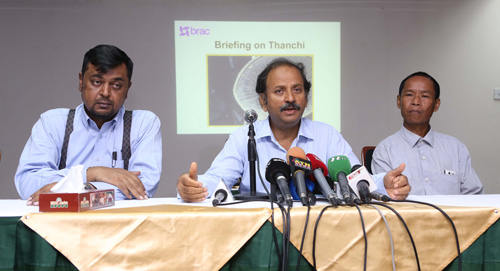
BRAC organised a press briefing today on Thursday on the food shortage in Thanchi upazila. BRAC directors KAM Morshed (left) and Gawher Nayeem Wahra (middle) and Thanchi local inhabitant Piyaching Mro.
Non-governmental organisation BRAC has urged the government to undertake long-term measures to sustainably solve the ongoing food shortage in the remote Thanchi upazila of Bandarban. Among a number of recommendations it has made includes urgent measure to issue voter identity cards to the citizens inhabiting remotest part of the upazila, which will ensure proper distribution of the government food aid.
BRAC organised the media briefing on Thursday at the BRAC Centre at Mohakhali to share its observations from the two field visits its officials made in the current month. More than a dozen staff members including the director of its Disaster Management and Climate Change (DMCC) programme visited the remote upazila.
DMCC director Gawher Nayeem Wahra made the recommendations at the briefing. Among other speakers at the event were Mr KAM Morshed, director, Advocacy for Social Change, Technology and Partnership Strengthening Unit, Piyaching Mro, local community leader in Thanchi, Khamlai Mro, former Thanchi upazila chairman, Apul Tripura and Chinmoy Mro of local civil society organisation Grouch and local volunteer Rajumoy Tanchangya.
The recommendations included cash assistance besides giving rice, fixing date, time and place for rice distribution and informing it to the families affected beforehand, strengthening of malaria diagnosis and treatment for remotest villages, providing alternative means for earning, creating suitable linkages to bring agro-produce to the market, developing transport communication.
BRAC officials said they have identified 1000 households in most need and already handed Tk 2000 cash to 200 families each to enable them to buy medicines and food.
Gawher Nayeem Wahra said, 'According to our estimates, around 20 thousand people of Thanchi upazila are suffering from food shortage. People in Tindu and Remakri unions along with 11 villages in the remotest part of Thanchi Sadar union are suffering the worst. In these areas Mro, Khumi, Tripura, Khyang and Bawm are in worse situation'.
BRAC ranked number one NGO in the world
NGO ADVISOR announced its 2016 Top 500 NGOs World rankings, and BRAC returned to the top spot
Geneva, Switzerland: BRAC, an international development organisation dedicated to spreading solutions to poverty worldwide, today was ranked the number one NGO in the world by the Geneva-based NGO Advisor, an independent media organisation committed to highlighting innovation, impact and governance in the non-profit sector. BRAC clinched the top spot as part of the 2016 Top 500 NGOs World rankings.
"This recognition is truly an honour," said Sir Fazle Hasan Abed, founder of BRAC. "BRAC staff work tirelessly to both innovate and apply proven solutions at scale to empower people worldwide living in poverty. It is wonderful to see this dedication recognised."
Each year, NGO Advisor researches, evaluates and ranks NGOs from around the world, highlighting the best in their annual Top 500 NGOs World list. NGO Advisor announced the new rankings on its website Friday, June 17.
Of more than 500 organisations worldwide, NGO Advisor placed BRAC first in its international category, based on its impact, innovation and sustainability. BRAC was praised for its holistic approach to fighting poverty, treating it as a system of interrelated barriers that must be addressed concurrently. The ranking also highlighted the organisation’s history of designing and implementing solutions at scale.
“From the perspective of our ranking criteria – impact, innovation and sustainability – BRAC ticks every box. Over the course of its decades-long history, BRAC has assumed an unparalleled position in the crowded field of international development, all while remaining committed to a holistic, evidence-based approach to poverty reduction,” said Jean-Christophe Nothias of NGO Advisor in a statement.
BRAC, formerly Bangladesh Rural Advancement Committee, was founded in Bangladesh in 1972, and today is a global leader in creating opportunities at scale as a means to end poverty. It is the world's largest non-governmental development organisation, touching the lives of an estimated 138 million people in 12 countries using a wide array of tools such as microfinance, education, healthcare, legal rights training and more to create opportunities for people most in need.
“As we noted last year, BRAC is in many ways a microcosm of the entire international development sector…gaining in independence from donor influence each year. It covers almost 80 per cent of its USD 684 million income through a burgeoning portfolio of catalytic social enterprises – a clear trend positioning the organisation in an enviable position of financial and programmatic sustainability,” said NGO Advisor on its website.
NGO Advisor combines academic rigour with journalistic integrity and autonomy, evaluating each organisation based upon its objective merits. Co-founded by Jean-Christophe Nothias, a journalist formerly with The Global Journal, the rankings methodology was first developed in 2009.
Nothias has since enlisted experts at The University of Geneva and partners from the non-profit sector to improve the evaluation metrics. Today, NGO Advisor presents its findings to an international audience of donors, volunteers, journalists, researchers, diplomats and non-profit leaders to showcase best practices and mirror the evolving values of the global community.
The new rankings include several notable organisations. The Skoll Foundation, a social entrepreneurship foundation based in Palo Alto, California, claimed the third spot, and Médecins Sans Frontières, also known as Doctors Without Borders, the number two. The Danish Refugee Council and Oxfam rounded out the rankings in the fourth and fifth spot, respectively. Last year, BRAC was ranked number two, after initially taking the first place spot two years ago.
BRAC and BRAC International Celebrates World Day for Cultural Diversity 2016
Unifying Uniqueness and Us
BRAC and BRAC International operating countries celebrated the Inclusion and Diversity Management Campaign (IDMC) day. This celebration is celebrated for the second time across BRAC’s head office and BRAC International countries on 21 May on world cultural diversity day under the theme “Unifying Uniqueness and Us”.
Likewise the last year, diversity day was celebrated in all BI countries, which had cultural and cooking events, games and dances. Additionally, this year’s programme took place over the course of a day and began in BRAC’s office premises with a display board erected for writing comments and hand printing to showcase what diversity means to BRAC. The main event began after lunch and was comprised of welcome speeches, presentations and panel discussions all relating to the importance of diversity to foster and instill its importance. The colorful cultural programme also featured performances from people of differing national, ethnic and physical abilities.
The main objective of the initiative was to enhance knowledge and sensitivity on diversity and inclusiveness and to increase empathy of other cultures through opportunities to interact with different cultures at the international level. The vision of IDMC is: to promote Intercultural sensitivity, embracing differences, easily adaptable mindsets and diverse perspectives, richer teams
Through a series of activities, this campaign aims to touch all the employees, all-level of staff and ultimately the programme participants (beneficiaries) along with the community.We hope to continue making great strides toward promoting diversity and inclusion in the workplace to ultimately help achieve the vision of BRAC.
National Safe Motherhood Day 2016
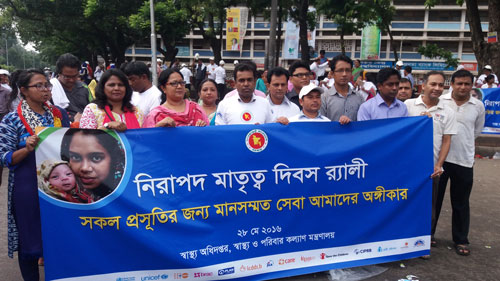
National Safe Motherhood Day 2016 was celebrated on May 28 across the country to create awareness on maternity care for pregnant and lactating women.
The health, nutrition and population programme (HNPP) of BRAC participated in the event along with the government through various activities. BRAC participated actively in all the government events at district and community level.
Let's have a look on BRAC's activities that were carried out on National Safe Motherhood Day 2016:
Activities done by essential health care (EHC) and maternal neonatal and child health programme (MNCH)
- Community health workers of essential health care (EHC) and maternal neonatal and child health (MNCH) programme mobilised the pregnant women to deliver anti natal care (ANC) and post natal care (PNC) from community clinic.
- Paramedics of MNCH rural programme provided free ANC/PNC to the women in char area.
- Manoshi midwives provided ANC/PNC to the women in slum areas in BRAC delivery centres.
- Field staff of HNPP attended a rally organised by the Ministry of Health of Bangladesh.
Activities done by Marketing Innovation for Health (MIH)
- Staff of MIH and other programmes of HNPP participated in the rally in seven districts and 51 sub-districts organised by government.
- Community health workers highlighted a range of topics like anti natal care, birth planning, usefulness of delivery kit among others during health education forum
- Community health workers of MIH programme mobilised mothers to deliver comprehensive ANC through government service centres.
Family Planning, Mother-Child Health and Adolescent Health Service and Campaign Week 2016: with successful participation of BRAC

Family planning, mother-child health and adolescent health service and campaign week 2016 was recently held across the country from 14-19 May. BRAC also observed this national event focusing on family planning counselling. BRAC worked intensively to promote family planning to create awareness among people concerning overpopulation, mother-child healthcare and adolescent health besides providing healthcare services to mothers, children and adolescents. Special daylong camps were organised at five maternity centres in Dhanmondi, Mirpur, Gulshan, Jatrabari and Uttara region of Manoshi project. Various family planning materials were distributed for free in those centres and people were advised on different methods of family planning. Md Delwar Hossain, director, directorate general of family planning, Dhaka division, Dr Md Abdul Haque AD, Dhaka and regional supervisor, FPCST-QAT, Mirza Kamrunnahar, DDFP, Dhaka district, Md Mizanur Rahman TFPO, family planning office Mirpur, Dhaka and other government officials visited the camps during the event.
Community Road Safety NGO Network
BRAC offers training on community road safety to local NGOs. This coalition of nationwide organisations formed a Community Road Safety NGO Network under the umbrella of BRAC. These organisations are supported through resources by BRAC for conducting road safety training and awareness campaigns within their operating areas.
The most important goal of the NGO Network is to build the capacity of NGO's, so they too can write project proposals, apply for funds, and use the financial support of donors to implement projects in their locality. This is done with the aim of sustainability for road safety activities (even after BRAC stops their road safety interventions in the project areas).
NGOs interested to join the network are welcome to apply. Once accepted, a NGO receives a road safety flipchart, a demonstration on how to use it and a short lecture on road safety. Every batch of 30 new members receive a day long orientation training on road safety.
BRAC uses this platform to jointly pursue road safety projects with any member organisations in their areas of operation. As of 2015, 337 NGOs have been brought under the network. BRAC also gives technical assistance to the member organisations so that they can conduct projects on road safety improvement.
Join the world’s biggest family

